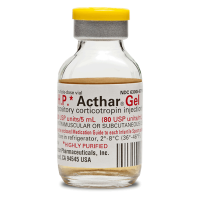Medicare Use of Expensive Pig Gland Drug Grows, while Military System and others Limit Use

Medicare is spending hundreds of millions of dollars on a decades-old drug that has questionable therapeutic value while other government health plans have cut back on dispensing the medication.
H.P. Acthar Gel, an injectable medication made from pig glands by Questcor Pharmaceuticals, is prescribed for symptoms of multiple sclerosis relapses and a rare kidney disease. Medicare, which accounts for about a quarter of Acthar prescriptions, pays an average of $41,763 per prescription for the drug and spent $141.5 million on it in 2012. The 2013 bill may reach $220 million, according to an investigation by ProPublica. In 2008, Medicare spent only $7 million on Acthar prescriptions.
Despite the growing use of Acthar, there are no scientific studies showing that the drug works any better than cheaper alternatives for the conditions for which it’s prescribed. For that reason, the military health care program Tricare, as well as some private insurers, have cut back or even cut out Acthar spending.
Medicare doesn’t have that option though. According to Medicare Part D rules, the plan must pay for any drug whose uses are approved by the Food and Drug Administration (FDA). Acthar was originally sold in 1952, when the FDA required only that drugs be safe, not that they were effective, and now it’s an approved drug for 19 conditions.
Acthar was originally marketed as a treatment for infantile spasms, a rare condition. Since then, its makers have recommended its use for kidney issues and multiple sclerosis although it has never undergone extensive clinical trials for those applications.
Some of the top Medicare prescribers of the drug have financial ties to Questcor. The top 10 prescribers account for 15% of all Medicare Acthar prescriptions, and four of those doctors get funding from Questcor as researchers, promotional speakers or both.
Other physicians are less enthusiastic about the drug. “The major problem with this treatment as I see it is the cost of the vial, and quite honestly, let’s face it, let’s be candid, this got approved at a time when the approval process was nowhere near as rigorous as it is today,” Patrick Nachman, a kidney specialist at the University of North Carolina, told ProPublica. Doctors like Nachman sometimes try Acthar when other therapies fail.
Insurers are also taking a hard look at the drug. Aetna’s national medical director for pharmacy policy and strategy, Dr. Ed Pazella, remarked at a conference that Questcor’s “combination of aggressive marketing and aggressive price increases finally caused it to become a line item that a finance guy looked at and said: ‘What the hell are we paying for this? Why? What is it?’ And that’s when we started looking at what’s our policy around this stuff.”
And now there are questions about Acthar’s safety. In a regulatory filing last month, Questcor reported that 5% of prescriptions resulted in adverse reactions to the drug, according to The New York Times. It’s the first time the company has reported problems with the drug, although it purchased the rights to Acthar in 2001.
Mallinckrodt Pharmaceuticals has made a $5.6 billion takeover offer for Questcor.
-Steve Straehley
To Learn More:
The Obscure Drug With a Growing Medicare Tab (by Charles Ornstein, Pro Publica)
Top Medicare Prescribers Rake In Speaking Fees From Drugmakers (by Charles Ornstein, Tracy Weber and Jennifer LaFleur, ProPublica)
Questcor Reveals Adverse Events Data for Acthar for First Time (by Gretchen Morgenson, New York Times)
- Top Stories
- Unusual News
- Where is the Money Going?
- Controversies
- U.S. and the World
- Appointments and Resignations
- Latest News
- Trump Orders ICE and Border Patrol to Kill More Protestors
- Trump Renames National Football League National Trump League
- Trump to Stop Deportations If…
- Trump Denounces World Series
- What If China Invaded the United States?






Comments